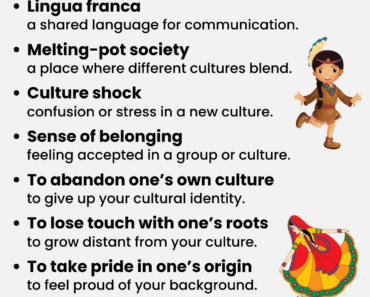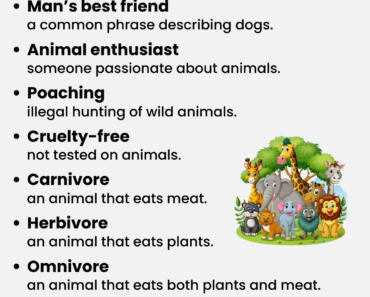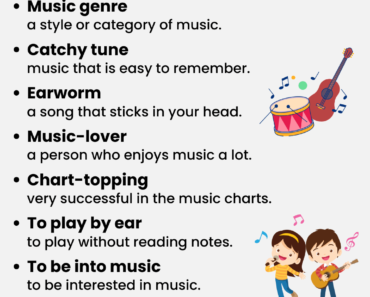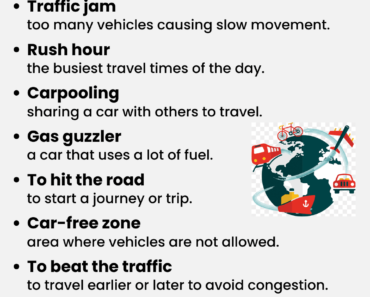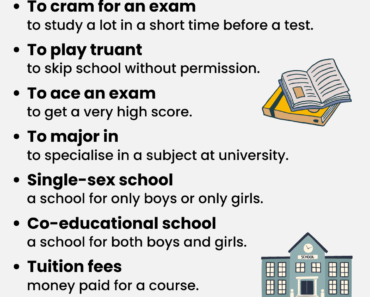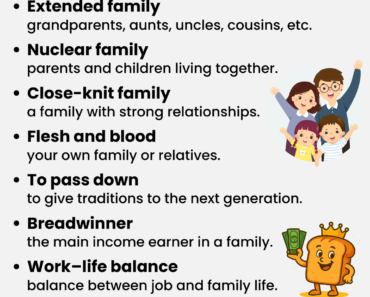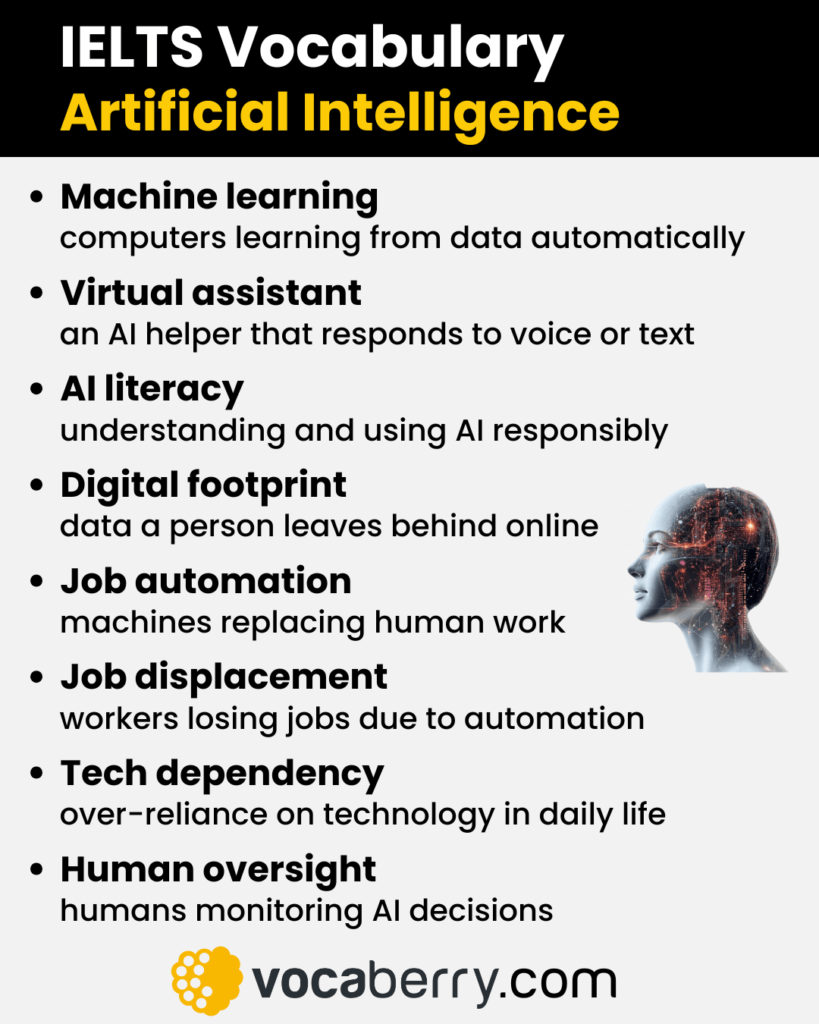
Artificial Intelligence is an increasingly relevant topic in the IELTS Speaking test. Examiners may ask you about the role of AI in daily life, its impact on jobs, education, or even how it compares to human intelligence. In this guide, you’ll find useful IELTS vocabulary for artificial intelligence with clear definitions, followed by IELTS Speaking Part 1, Part 2, and Part 3 questions with sample answers.
IELTS Vocabulary for Artificial Intelligence (AI)
Here is some useful IELTS vocabulary for talking about artificial intelligence with clear definitions. These words and phrases will help you give better answers in the IELTS Speaking test.
- Artificial Intelligence (AI) – machines doing tasks like human thinking
- Machine learning – when computers improve automatically using data.
- Deep learning – advanced machine learning using neural networks.
- Algorithm – a set of instructions a computer follows to solve a problem.
- Automation – using machines or software to perform tasks without human help.
- Chatbot – a program that talks with users through text or voice.
- Virtual assistant – an AI-powered digital helper, such as Siri or Alexa.
- Smart device – a gadget that connects and interacts intelligently.
- Voice recognition – technology that understands spoken language.
- Facial recognition – a system that detects or verifies a person’s face.
- Neural network – a computer system modeled on the human brain.
- Big data – extremely large sets of information that computers can analyze.
- Prompt – a command or input given to an AI to generate a response.
- Human oversight – human monitoring to check AI decisions
- Real-time processing – analyzing data immediately as it’s received
- Natural language processing (NLP) – AI understanding and using human language
- Predictive analytics – using data and AI to predict future events or behavior.
- Human-AI collaboration – humans and AI working together to complete tasks.
- AI-powered technology – systems that work using artificial intelligence.
- Self-driving car – a car that drives itself without human control.
- AI regulation – laws or rules that control the use of AI.
- AI ethics – moral rules about the responsible use of AI.
- Bias in AI – unfair results caused by flawed data or design.
- Digital transformation – the use of digital tools in all areas of life or business.
- Human-like intelligence – the ability of AI to think or act like humans.
- Job automation – replacing human work with machines or software.
- Automation-resistant jobs – work that AI is unlikely to replace.
- Cybersecurity – protecting computers and networks from digital attacks.
- Technological advancement – the improvement and innovation of technology.
- Digital footprint – the data a person leaves behind online.
- Cutting-edge technology – the latest and most advanced tech.
- AI-driven decisions – choices made with the help of AI.
- Job displacement – when workers lose their jobs due to automation.
- Ethical concerns – questions about what is right or wrong in tech use.
- Smart home – a house with devices controlled by AI or automation.
- Robotics – the technology of designing and using robots.
- AI-powered healthcare – medical services supported by artificial intelligence.
- Data-driven approach – making decisions based on data analysis.
- Sentiment analysis – using AI to detect emotions or opinions in text.
- Recommendation system – AI that suggests content based on user behavior.
- Augmented intelligence – when AI supports rather than replaces humans.
- Generative AI – AI that creates new content like text, images, or music.
- AI literacy – the ability to understand and use AI responsibly.
- Explainable AI – AI systems that can clearly explain how decisions are made.
- Automation fatigue – stress from overusing automated systems.
- Digital ethics – rules about how to use technology responsibly.
- Smart algorithms – advanced rules or methods that guide AI behavior.
- AI surveillance – monitoring people or environments using AI systems.
- Tech dependency – over-reliance on technology in daily life.
- To automate tasks – to make machines handle repetitive or simple jobs.
- To enhance productivity – to increase output or efficiency using technology.
- To process data – to collect and analyze digital information.
- To replace human labor – when machines take over human jobs.
- To revolutionize industries – to completely change sectors with new technology.
- To ensure data privacy – to protect personal or sensitive information.
- To rely on technology – to depend on digital systems in daily life.
- To integrate AI – to add artificial intelligence into systems or products.
- To adapt to technological change – to adjust to new tech or systems.
- To collect and analyze data – to gather and study digital information.
IELTS Speaking: Artificial Intelligence Questions & Answers
In this section, you’ll find IELTS Speaking Part 1, Part 2, and Part 3 questions on artificial intelligence with sample answers. These examples show how the AI-related vocabulary can be used in your responses during the test.
IELTS Speaking Part 1 – Artificial Intelligence
What do you think about self-driving cars?
I think they’re an impressive example of AI-powered technology. They combine data-driven approaches, real-time processing, and deep learning to navigate safely. Although they’re still developing, they could reduce accidents and help people who can’t drive.
Do you think AI makes life easier or more complicated?
In general, I think it makes life easier. For instance, AI-powered technology can automate simple tasks, which really helps to enhance productivity. But at the same time, if we depend too much on it, it can lead to tech dependency or even automation fatigue, especially when systems malfunction or become hard to manage.
Do you trust AI to make decisions for you?
To some extent, yes. For example, I use a recommendation system on streaming platforms, and it works well. But for bigger things, I think human oversight is necessary. We can’t rely completely on AI-driven decisions, especially in sensitive areas.
Do you think AI affects people’s jobs?
Definitely. In many industries, there’s been a rise in job automation, where machines take over repetitive tasks. This has led to job displacement for some, but also created new roles in automation-resistant jobs, especially in tech and creative fields.
Would you feel comfortable living in a smart home?
I think so. As long as my data privacy is protected, I’d enjoy using smart home features. The idea of controlling appliances through AI sounds convenient, and I think such tools are becoming more reliable thanks to technological advancement.
IELTS Speaking Part 2 – Artificial Intelligence Cue Card
Describe a useful piece of artificial intelligence technology you use or have heard about.
You should say:
- what it is
- what it does
- how you use it (or how people use it)
- and explain why you find it useful.
Sample Answer:
One piece of artificial intelligence (AI) technology that I find incredibly useful is the virtual assistant on my smartphone. I personally use Google Assistant, but others like Siri or Alexa are quite similar. It’s basically an AI-powered technology that uses voice recognition to understand spoken commands and respond accordingly.
What makes it really impressive is its ability to use natural language processing (NLP), which means I don’t need to speak in a robotic or very specific way. It understands me quite naturally. Over time, it learns from my habits using machine learning, so its responses get more accurate. For example, it gives better suggestions thanks to its recommendation system, and even handles real-time processing when I ask for live updates, like the weather or traffic conditions.
I use it daily to set alarms, manage my schedule, reply to messages, and even control other smart devices in my home, like lights or the TV. It’s become part of a basic smart home setup, which honestly helps me to enhance productivity and stay organised.
What I appreciate most is how much time it saves. Instead of going through apps or typing, I just give it a prompt, and it handles the task immediately. Of course, I’m also aware of the importance of data privacy, especially when it comes to devices that are always listening, but I try to manage the settings carefully.
Overall, I think AI-powered technologies like this are excellent examples of how AI can make life more efficient without being overwhelming. They show how well-designed tools can support us in everyday tasks through a mix of automation, natural interaction, and smart learning.
IELTS Speaking Part 3 – Artificial Intelligence Discussion
IELTS Speaking Part 3 questions about artificial intelligence often ask you to compare human and machine intelligence, explore the impact of AI on jobs and education, and share your views on the benefits and risks of AI in modern society.
What impact is AI having on people’s daily lives?
AI is already playing a big role in everyday life, even if people don’t always realise it. For example, we often interact with virtual assistants or rely on recommendation systems when watching shows or shopping online. Many people also live in homes with smart devices that use real-time processing to adjust lighting, temperature, or security settings. These tools help to enhance productivity and save time. But at the same time, there’s a growing concern about tech dependency, as people become too reliant on automated solutions.
Do you think AI will completely replace human workers in the future?
I don’t think AI will fully replace humans, but it will definitely change the job market. In sectors like manufacturing or data processing, job automation has already taken over many tasks. However, there are still many automation-resistant jobs that require human creativity, emotional intelligence, or complex decision-making. I believe the future will involve Human-AI collaboration, where machines assist with repetitive or data-heavy tasks, and humans focus on work that needs flexibility and judgement. The key is learning how to work alongside AI, not fear it.
What are the possible risks of relying too much on AI?
One of the biggest risks is the erosion of human skills. When people rely too much on AI-powered technology, they may lose the ability to think critically or solve problems independently. There’s also automation fatigue, where constant interaction with digital systems can lead to stress or mental overload. Another serious concern is data privacy. If AI systems collect and process personal information without strict AI regulation, it can lead to misuse or breaches. That’s why proper digital ethics and oversight are essential.
Should schools teach students about AI?
Absolutely. As AI-powered technology becomes more common in daily life, it’s important for schools to promote AI literacy. Students already use tools like virtual assistants or smart devices, but many don’t understand how they work. Learning about machine learning, algorithms, and basic natural language processing (NLP) can help them use technology more wisely. It also teaches them to think critically about digital ethics, data privacy, and the responsible use of AI. This way, they’re prepared not just to use AI, but to shape its future in a thoughtful way.
More IELTS Vocabulary Topics
If you found this lesson useful, explore other IELTS Speaking topics to expand your vocabulary and practice with sample answers:
- IELTS Vocabulary: Accommodation
- IELTS Vocabulary: Advertisement
- IELTS Vocabulary: Animals
- IELTS Vocabulary: Art
- IELTS Vocabulary: Books
- IELTS Vocabulary: Childhood
- IELTS Vocabulary: Crime and Punishment
- IELTS Vocabulary: Culture and Traditions
- IELTS Vocabulary: Daily Routine
- IELTS Vocabulary: Education
- IELTS Vocabulary: Environment
- IELTS Vocabulary: Family
- IELTS Vocabulary: Fashion and Clothes
- IELTS Vocabulary: Films
- IELTS Vocabulary: Food & Diet
- IELTS Vocabulary: Friends
- IELTS Vocabulary: Gifts
- IELTS Vocabulary: Health
- IELTS Vocabulary: Hobbies
- IELTS Vocabulary: Hometown
- IELTS Vocabulary: Money
- IELTS Vocabulary: Museums
- IELTS Vocabulary: Music
- IELTS Vocabulary: Plants
- IELTS Vocabulary: Shopping
- IELTS Vocabulary: Social Media
- IELTS Vocabulary: Sports
- IELTS Vocabulary: Technology
- IELTS Vocabulary: Transport
- IELTS Vocabulary: Travel
- IELTS Vocabulary: Weather
- IELTS Vocabulary: Work & Jobs

